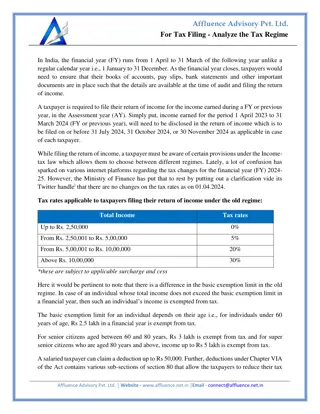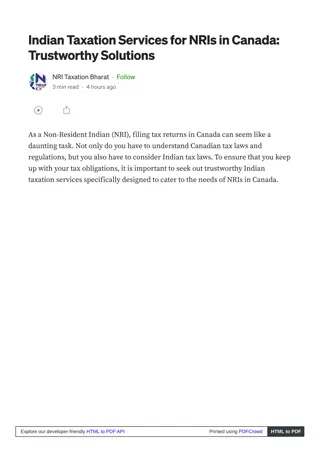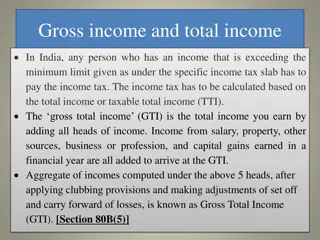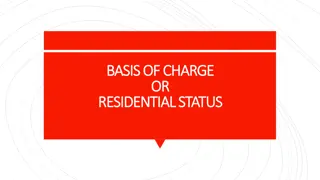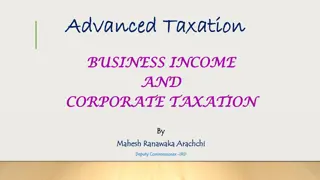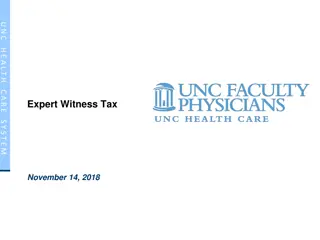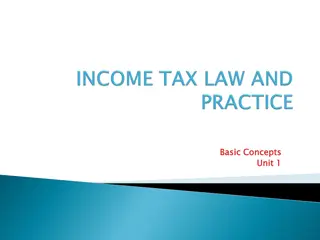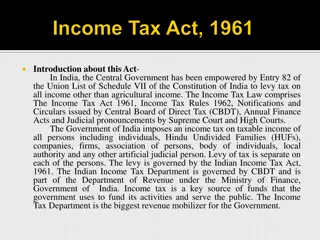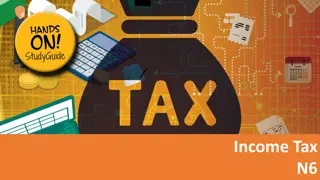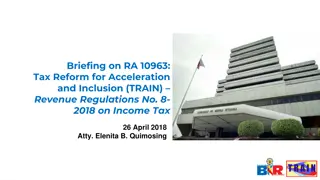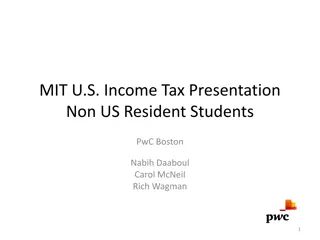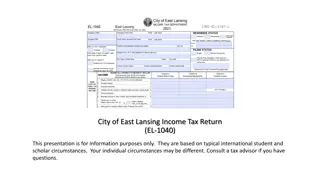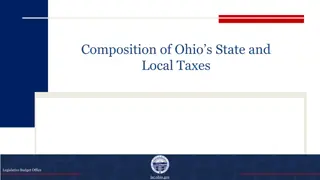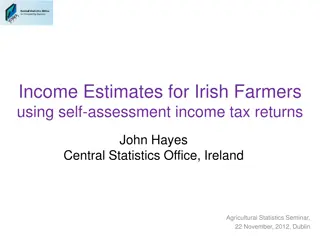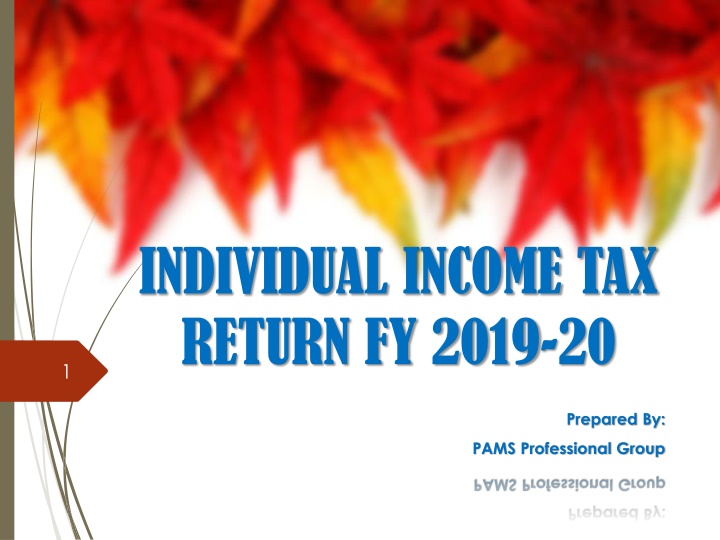
Income Tax in India: Forms, Slabs, and Requirements
Explore the basics of income tax in India, including different forms, tax slabs for individuals, heads of income, and essential requirements for filling income tax returns. Gain insights into slab rates, nature of income covered, and more.
Download Presentation

Please find below an Image/Link to download the presentation.
The content on the website is provided AS IS for your information and personal use only. It may not be sold, licensed, or shared on other websites without obtaining consent from the author. If you encounter any issues during the download, it is possible that the publisher has removed the file from their server.
You are allowed to download the files provided on this website for personal or commercial use, subject to the condition that they are used lawfully. All files are the property of their respective owners.
The content on the website is provided AS IS for your information and personal use only. It may not be sold, licensed, or shared on other websites without obtaining consent from the author.
E N D
Presentation Transcript
INDIVIDUAL INCOME TAX RETURN FY 2019-20 1 Prepared By: PAMS Professional Group
INDEX 2 Basic terms of Income Tax, Form 26AS, 16, 16A, 16B Heads of Income Tax Slabs for Individuals Act and Rules related to ITRs, Due dates, Computation Types of ITR Forms
Basic terms of Income Tax 3 Income Tax Return is the form in which assesse files information about his Income and tax thereon to Income Tax Department. Income Tax in India: Income Tax in India categorized as direct Tax. Direct tax is a tax you pay on your income directly to the government. Direct Taxes are classified as : a)Slab Rates This includes taxes as per slab rate on individual or a Hindu Undivided Family or AOP/BOI income earned during the PY. b)Other than Slab rates This category includes companies, firm, LLP for payment of taxes as per their respective tax rates on income which they earned during the PY.
Basic terms of Income Tax 4 Basic Requirements for filling ITR forms 1) Assessee 2) Residential status 3) Permanent Account Number 4) Aadhaar Number 5) Form-16 Issued by Employer 6) Form 26AS, Form 16/16A/16B (TDS Certificates) 7) Heads of Income 8) Exemption and deductions 9) Set off of losses 10) Gross Total Income 11) Chapter VI-A deduction 12) Total Income or Taxable Income 13) Tax on total income
Heads of Income 5 Head of income Nature of income covered Income From Salary Income from salary and pension are covered under here Income From other sources Income from savings bank account interest, fixed deposits Income from House property Rental income & House Property Loan Income from Capital Gain Income from sale of a capital asset such as mutual funds, shares, house property etc. Income from Business & Profession This is when you are self-employed, Examples- Chartered Accountant, Doctor, Lawyers their own practices, Business Man etc.
Slab Rate FY 2019-20 6 Income Tax Slabs & Rates for Individual Tax Payers (Less Than 60 Years Old) for FY 2019-20 Income Tax Slab Up to Rs. 2.5 Lakh Rs. 2.5 Lakh 5 Lakh Tax Rate for Individual & HUF No Tax 5% Rs. 5 Lakh 10 Lakh 20% Above Rs. 10 Lakh 30% Note:- surcharge is levied on income tax if taxable income exceeds 50 lakhs. 10% if TI above 50 lakhs but below 1Cr. 15% (TI >1cr and < 2cr) 25% (TI > 2cr < 5cr) 37% if TI exceeds 5 cr. Note:- The interim budget for FY 2019-20 has introduced full tax rebate under section 87A for individuals earning a net taxable income up to Rs. 5 lakhs
Slab Rate FY 2019-20 7 Income Tax Slab for Senior Citizens (60 Year But not Above 80 Years) & Super Senior Citizens (80+ Year Above) Income Tax Slab Tax Rate for Senior Citizens Nil 5% Tax rate for Super Senior Citizens Nil Nil Up to Rs. 3,00,000 Up to Rs. 3,00,000 to 5, 00,000 Up to Rs, 5,00,000 to 10,00,000 Above Rs. 10 Lakh 20% 20% 30% 30% Note- An additional 4% Health & education cess will be applicable on the tax amount calculated
Exemptions and Deductions 8 HRA exemption- Minimum of the followings: Actual HRA received, 50% of [basic salary + DA] for those living in metro cities (40% for non-metros), Actual rent paid less 10% of basic salary + DA Housing loan- Under section 24 of the Income Tax Act, one can avail the deduction on Home Loan for payment of Interest tax benefit. The self- occupied property allows the deduction with the maximum limit of Rs. 2 lakh if it takes the completion within 5 years from the end of the Financial Year, otherwise the maximum limit is Rs. 30,000 Some exempted allowances- Children Education allowances- Children Education allowances 100 Per child only for 2 Children, Hostel facility- hostel facility 300 per month only for 2 child. Section 80C- EPF, pension, Life insurance Premium, tax Saving mutual fund, Sukanya samrodhi Account, PPF Account Contribute, national Saving Certificate, tax Saving fixed Diposite, Etc.you can reduce up to Rs 1,50,000 from your total taxable income, and it is available for individuals and HUFs
Deductions 9 Income tax deduction Chapter VIA Section 80D- 25000, the premium should be for you, your spouse, & depend children, Either you, your Spouse Senior Citizen the limited gross up 50000. Medical insurance- Allowed claim deduction 80DDA- The Person Physically or Mentally disabled the income tax exemption limit up to 50000 80E- Exemption Claim for interest on education loans 80G- Deduction for donation 80GG- deduction for housing rent paid less than 10% salary, 5000 Per moth maximum 60000 p.a, 25% total income, 80TTA- Saving Account deduction less than 10,000 80TTB- Tax Deduction for Senior Citizens on Interest Income Maximum Rs. 50,000
Extension of return filing due date 10 The government, on May 13, 2020, announced the extension of the income tax return (ITR) filing deadline for FY 2019-20 to November 30, 2020 from July 31, 2020. The extension has come after the government, in March
Computation of Taxable Income 11 Amount XXXX Income under Salary or Taxable Salary XXXX Income or Loss under HouseProperty XXXX Income or Loss under PGBP XXXX Income or Loss from Capital Gain XXXX Income or Loss from other sources (XXXX) (-) Set off of Brought Forward losses XXXX = GROSS TOTAL INCOME (XXXX) (-) Chapter VI-A deduction (XXXX) (-) Deduction u/s 10A / 10B / 10BA XXXX = TOTAL INCOME / TAXABLE INCOME
Computation of Taxable Income 12 xxxx TOTAL INCOME / TAXABLE INCOME XXXX Tax on Total Income (both at normal and special rates) (XXXX) (-) Rebate u/s 87A XXXX Tax After Rebate XXXX (+) Surcharge and Cess XXXX Total Tax, SC and Cess (XXXX) (-) Relief u/s 89/90/90A/91 XXXX (+) Interest u/s 234A / 234B /234C XXXX Total Tax and Interest (XXXX) (-) TDS / TCS (XXXX) (-) Advance Tax / Self Asst. Tax XXXX Balance Tax Payable or (REFUND DUE)
ITR Form for Individuals 13 ITR-1 Individuals being a Resident (other than Not Ordinarily Resident) having Total Income up to Rs. 50 lakhs, having Income from Salaries, One House Property, Other Sources (Interest etc.), and Agricultural Income up to Rs. 5 thousand (Not for an Individual who is either Director in a company or has invested in Unlisted Equity Shares) ITR-2 Individuals and HUFS having (except income from profits and gains of business or profession)Salary/Pension, more than one house property, Capital investments/property both short term & long term, Income from Other Sources, Foreign Assets/Foreign Income, Agricultural Income more than Rs. 5000, Resident not ordinarily resident and a Non-resident A Director of listed and unlisted companies will be required to file their returns in ITR-2. Gains/loss on sale of
ITR Form for Individuals 14 ITR-3 Individuals and HUFs having income from profits and gains of business or profession, If you are an Individual Director in a company, If you have had investments in unlisted equity shares at any time during the financial year, Return may include income from House property, Salary/Pension and Income from other sources, Income of a person as a Partner in the firm. ITR-4 Individuals, HUFs and Firms (other than LLP) being a Resident under presumptive income from Business and Profession which is computed under sections 44AD, 44ADA or 44AE (Not for an Individual who is either Director in a company or has invested in Unlisted Equity Shares)
16 Any Questions Any Questions ??? ???


